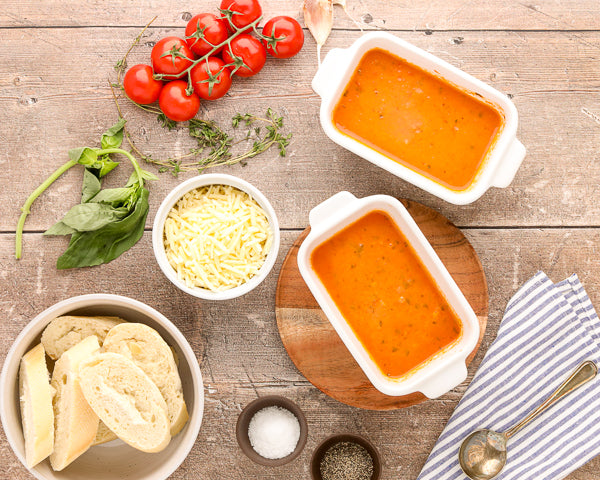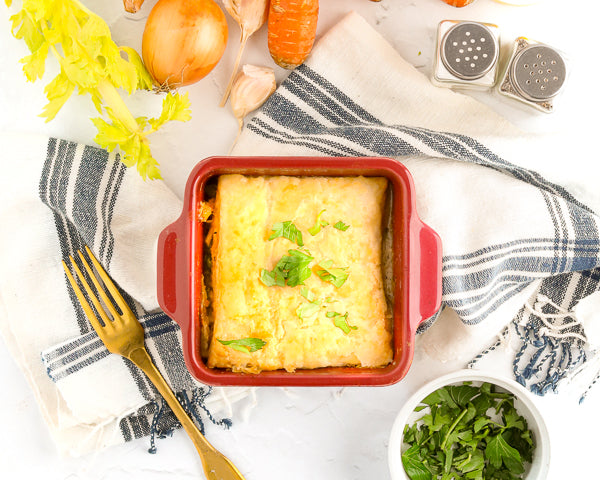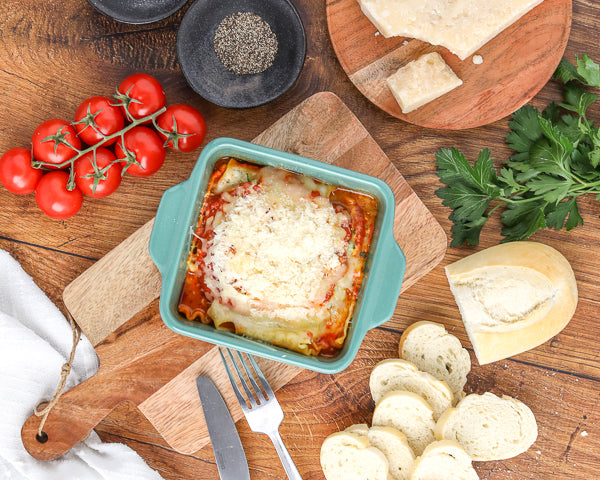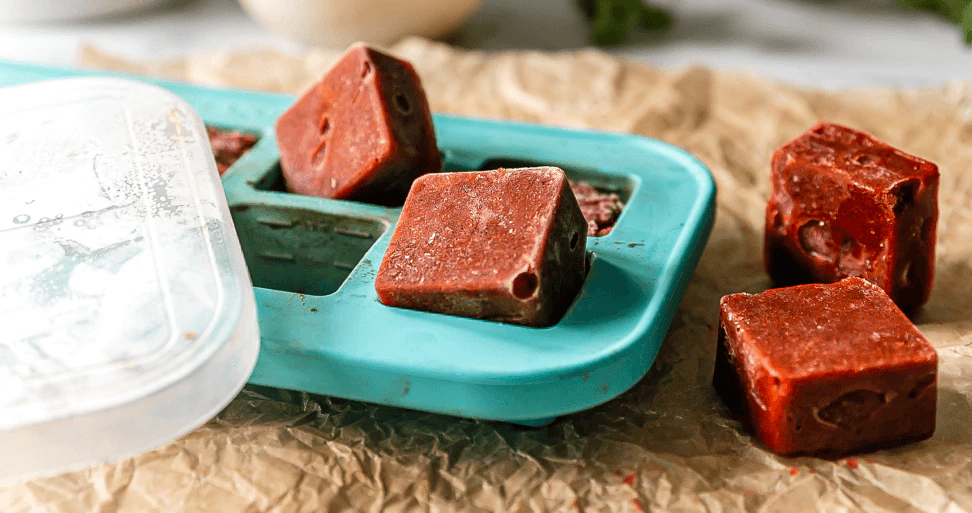
Have you been struggling to find the BEST container to freeze your meal prep or leftovers? If so, you've come to the right place!
Choosing the right container to freeze your meal prep is crucial! There's nothing worse than freezing your food in certain glass containers and having the glass shatter from the cold temperatures or putting all of your leftovers in one container and having to thaw copious amounts of food just for one dinner. When that happens, the thought "there must be a better solution!" probably crosses your mind.
Fortunately for you, we’re here to end your hunt for the best freezer-friendly food container with this article. Let's dive in!
What is a Freezer-Friendly Container Really?
Before breaking down the pros and cons of various containers, it’s important to know that freezer containers are more than just your average plastic container. Ideally, freezer containers are food storage containers that can hold your delicious soups, hummus, sauces or other foods in the freezer without cracking or emitting harmful toxins.
Why The Type of Freezer Container You Use Matters
Choosing the best freezer container matters more than you know! Using the wrong containers for your freezer meal prep could cause you to freeze larger portions of food than you’re able to eat or could cause your food to become freezer burned faster. Certain containers are also more prone to breaking or cracking over time, leading to annoying messes and more waste. Whether you want to freeze your leftovers or have batch-cooked a few meals for the freezer, the type of freezer container you use is essential for successful freezer meal prep.
Pros & Cons of Different Freezer Containers
There are dozens of freezer-safe containers on the market, and choosing one that is best at preserving food and holding up in the freezer will make your meal prep and cooking experience much better. When you're choosing the best freezer containers, look out for containers that are:
- BPA-free - BPA is a harmful toxic chemical found in most plastic products. It has been linked to causing immunity issues, as well as reproductive and neurological problems.
- Durable - Having a durable container will allow you to feel confident that your container won’t bend, tear or break under colder temperatures.
- Airtight - This helps preserve the flavor of your food and can help slow down or prevent freezer burn.
- Reusable - With the large amounts of products in the landfill, it's important to use reusable containers and limit the amount of waste you produce.
- Dishwasher-safe - This added bonus will make your clean-up process much more efficient.
- Oven-safe - Oven-safe containers can be a game-changer for freezer meal prep. Once your items are frozen, you can easily cook meals in the same container straight from frozen.
Now that you know what to look out for, let’s go through different types of freezer storage containers and weigh their pros and cons.
Glass Containers

Glass freezer containers are a common choice for people that are freezing their leftovers or meal-prepped foods. Not only are they easily accessible, but they are also aesthetically appealing. Let’s dive into the pros and cons of glass containers.
Pros
There are a few benefits to using glass containers to freeze your food:
- BPA- free: no glass product contains BPA. This toxic chemical is typically found in plastic products.
- Dishwasher safe: Besides delicate glass, which you shouldn’t use for freezing food anyways, most glass containers are top-rack dishwasher safe.
- Clear: When you freeze your food, it’s much easier to know what food is stored in the container because glass is transparent. There’s nothing worse than reheating a meal and finding out it’s not what you expected, which can happen with opaque plastic containers.
Cons
Sadly, the cons outweigh the pros for these glass food storage containers. Here are the cons of glass containers:
- Breakable: When you’re batch cooking, your counters will be full of cooking utensils, ingredients and containers. If your container gets knocked over or dropped, it could shatter. Not only is the mess annoying to clean up, but now you are down one container!
- Rigid: Quick science lesson–in colder climates, things expand! If you don’t leave enough space at the top of your glass containers, your food will expand and may cause your glass jars or other glass containers to crack in your freezer. I don’t know about you, but we do not want to deal with that mess!
- Size: Most glass containers are not individually sized, so it can be challenging to freeze food in portions that work best for you and your family.
- Container Availability: Glass containers aren't molds, so you have to have a large amount of containers to store your other food.
Overall, using glass in the freezer isn’t necessarily a bad choice; it’s just a risky one! When you’re meal prepping, it can take a couple of hours to get your food ready to freeze, and after all of that, the last thing you want is to clean up the glass.
Pro Tip: If you’re choosing to use a glass container, make sure you use one with sturdy borosilicate glass–it’s less likely to shatter!
Plastic Containers

Plastic freezer containers are many people’s go-to for freezing family lunches and leftovers because they are readily available and relatively easy. Let’s break down the pros and cons of plastic containers.
Pros
Plastic containers have a few pros that we should take into consideration:
- Budget-Friendly: Plastic is typically a cheaper alternative to other containers such as glass.
- Convenient: Plastic containers are easy to find in the stores or online, you may even find a few containers hiding in the back of your cupboard.
Cons
Let’s weigh in on why plastic containers aren’t always the best option:
- Not BPA-Free: Although some plastic is BPA-free, most plastic does contain BPA. BPA is a toxic chemical that can be super harmful to the human body, and frankly, in our opinion, not worth the risk.
- Unsustainable: Plastic can not be recycled and loses quality quickly, so when it wears out, it adds to the mass amounts of waste that we already have in the landfill.
- Crackable: Many types of plastic aren’t durable. When they’re in your freezer for a long time, they are susceptible to cracking at low temperatures.
- Container Availability: Plastic containers aren't molds, so you have to have a large amount of containers to store your other food.
We don’t use plastic freezer containers to store our food simply because we know there are better alternatives out there! Although plastic is a ubiquitous freezer storage container and it’s easy to use, we aren’t its biggest fan.
Ziplock Bags

Commonly, Ziplock bags are used to store meat, or larger amounts of food–especially after Thanksgiving or other holidays when there are tons of leftovers. Let’s check out the pros and cons of Ziplock bags.
Pros
Here are some pros to using Ziplock bags in the freezer:
- BPA-free: All Ziplock branded bags are free of toxic chemicals.
- Easy to store: Ziplock bags are very space-efficient and don’t take up a lot of room in your freezer!
- Durable: Ziplock bags aren’t likely to tear, can’t shatter and won’t crack!
Cons
Here are some cons to think about when freezing food in Ziplock bags:
- Not stackable: You can’t stack Ziplock bags the same way you can stack other containers.
- Harder to portion control: Unless you have already frozen some of your food and are moving it over to a Ziplock bag, you will have difficulty creating the perfect portions for your family. If you’re pulling out your leftovers, you probably don’t want to eat all of your turkey leftovers in one go!
- Tearable: Ziplock bags can easily tear if it gets caught or if the frozen food is squishing against the bag.
- Hard to thaw: When you freeze your meals in a large flat bag, it can be harder to thaw in a bowl or pot.
Overall, we like Ziplock bags, but not for everything; we’ll get more into that below!
Keep in mind that we are talking about Ziplock branded bags. There are many alternatives out there, but they are not all free of chemicals.
Souper Cubes®

Souper Cubes® are highly durable silicone freezer food trays designed specifically to address the flaws of other freezer containers and make freezer meal prepping easy and stress-free. The trays are available in various shapes and sizes to ensure you can freeze food in the exact portions you want. With their snug-fitting plastic lids, Souper Cubes® provide a seal that will help you maintain your food quality while it is frozen. Let’s discuss the pros and cons of Souper Cubes®.
Pros
Here are some pros to using Souper Cubes® when storing your frozen foods:
- BPA-free: Don’t stress about any toxic chemicals in these silicon containers or their plastic lids; Souper Cubes® are entirely BPA-free!
- Container Availability: Since Souper Cubes® are molds, you don’t have to hold your other containers hostage. Simply pop out your food and place in a freezer-safe bag to reuse your trays.
- Durable: Souper Cubes® are built with thick silicone walls and a steel-embedded rim, making them extra sturdy.
- Snug-fitting Lid: The provided clear plastic lids fit snug on your Souper Cube® trays, keeping freezer odors out and prevents freezer burn.
- Reusable: Souper Cubes® can be used thousands of times and still always look and perform as if they’re brand new.
- Dishwasher safe: After you pop your frozen meals out of your containers, you can save time by popping the tray into the top rack of your dishwasher for a deep cleaning.
- Oven safe: Store, freeze and cook your meals in Souper Cubes®. Without the plastic lid, place your trays in your oven for temperatures up to 415F.
- Portion control: With options to use ½ cup, 1-cup, 2-cup or 2 tbsp trays, you can perfectly portion food and sauces for you or your entire family! Some of these trays also come with fill lines, so you can choose the portion size that works best for you.
Cons
Here is one con that we can think of with Souper Cubes®:
- You can’t get enough: we know this isn’t really a con, but once you have your Souper Cubes®, we guarantee you won’t be going back to freezing plastic or glass containers!
Souper Cubes® VS. The Rest
After analyzing the advantages and disadvantages of different food storage containers for freezing food, it’s safe to say that Souper Cubes® are by far the best option if you value convenience, safety, and sustainability. These trays are not only great for freezing your food but are perfect for helping you freeze food in the perfect portions for your family.
Additional Freezer-Friendly Supplies
You might be wondering if there are any additional food containers that can help you freeze your meals more successfully. There is one that we commonly use and talk about a lot in our freezer-friendly recipes; vacuum sealer bags.
Vacuum sealer bags are a great way to preserve food and keep your freezer meals fresh for as long as possible. When you’re freezing meals, place your food in Souper Cubes® trays and stick them in the freezer. Once the food is frozen, move the frozen cubes to Ziplock bags or vacuum-sealed bags to help you organize your freezer effectively and save space for other frozen items. Plastic freezer bags are a great way for you to maximize space in your freezer. If you’re looking for additional tips to create space and organize your freezer, check out our chest freezer organization tips blog!
When prepping food that you will eat in the short term, use Ziplock bags. If you plan to prepare food for the long term (4 months or so), we recommend you use vacuum-sealed bags. These freezer bags will help keep food fresh and will help reduce the chance of freezer burn. Think of these bags as your trusted second step when freezing your delicious meals.
If you’re looking for reusable and more sustainable freezer-safe bags to store your frozen Souper Cubes®, you can also use Stasher® bags or ReZip® bags.
The Best Containers For Freezing Food

Are you ready to make cooking dinners a lot easier? Cooking a new meal every day is no longer the “norm.” Meal prepping for weeks ahead will keep your dinner plans easy, delicious and long-lasting.
Level up your freezer meal prep with Souper Cubes®. Purchase your freezer-safe meal prep containers today!
If you’re just starting to prepare freezer meals and are looking for some delicious recipes, be sure to check out our fantastic selection of freezer-friendly recipes. These recipes include steps on cooking, freezing, and thawing your meals with Souper Cubes® so you and your family can enjoy better, safer, perfectly portioned freezer meal prep. Happy freezing!










We would love to hear your ideas or better yet, post a photo of your cubes organized in our Freezer Meals & Recipes Facebook Group!